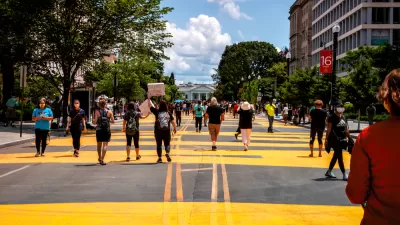Planners in Washington D.C. are bracing for the arrival of millions of visitors for President Obama's inauguration -- which they expect will overwhelm the parking supply and the public transit system.
"More than a month before Obama is sworn in, D.C. is in the grips of inaugural madness. The mayor suspended all the usual rules for property rentals for the week (and won't charge local taxes on any rental revenue), setting up a legal free-for-all on the housing front. Planners are freaking out about what to do with an estimated 10,000 buses that will ferry people into the city for the ceremony (enough, if lined up end-to-end, to circle the entire Capital Beltway); there's nowhere to park them all, and not many good ways to get people from wherever they park to the inauguration. The folks who run the Metro system are basically just giving up -- they want anyone who's coming from less than two miles away to walk.
When public transportation officials start telling people not to take public transportation, you know things are getting weird.
Still, the Obama mania seems to be going well past anything the city has experienced before. Officials working for Obama's inauguration committee, which handles the parade and the fanciest parties, say they're confident the city will be ready to handle whatever happens next month. But if anything close to 4 million people turn up -- about seven times the city's population -- it's hard to figure out exactly how it could all go according to plan. By the time Jan. 20 actually gets here, D.C. may be completely crazed."
FULL STORY: Obama mania grips the capital

Maui's Vacation Rental Debate Turns Ugly
Verbal attacks, misinformation campaigns and fistfights plague a high-stakes debate to convert thousands of vacation rentals into long-term housing.

Planetizen Federal Action Tracker
A weekly monitor of how Trump’s orders and actions are impacting planners and planning in America.

San Francisco Suspends Traffic Calming Amidst Record Deaths
Citing “a challenging fiscal landscape,” the city will cease the program on the heels of 42 traffic deaths, including 24 pedestrians.

Defunct Pittsburgh Power Plant to Become Residential Tower
A decommissioned steam heat plant will be redeveloped into almost 100 affordable housing units.

Trump Prompts Restructuring of Transportation Research Board in “Unprecedented Overreach”
The TRB has eliminated more than half of its committees including those focused on climate, equity, and cities.

Amtrak Rolls Out New Orleans to Alabama “Mardi Gras” Train
The new service will operate morning and evening departures between Mobile and New Orleans.
Urban Design for Planners 1: Software Tools
This six-course series explores essential urban design concepts using open source software and equips planners with the tools they need to participate fully in the urban design process.
Planning for Universal Design
Learn the tools for implementing Universal Design in planning regulations.
Heyer Gruel & Associates PA
JM Goldson LLC
Custer County Colorado
City of Camden Redevelopment Agency
City of Astoria
Transportation Research & Education Center (TREC) at Portland State University
Jefferson Parish Government
Camden Redevelopment Agency
City of Claremont





























